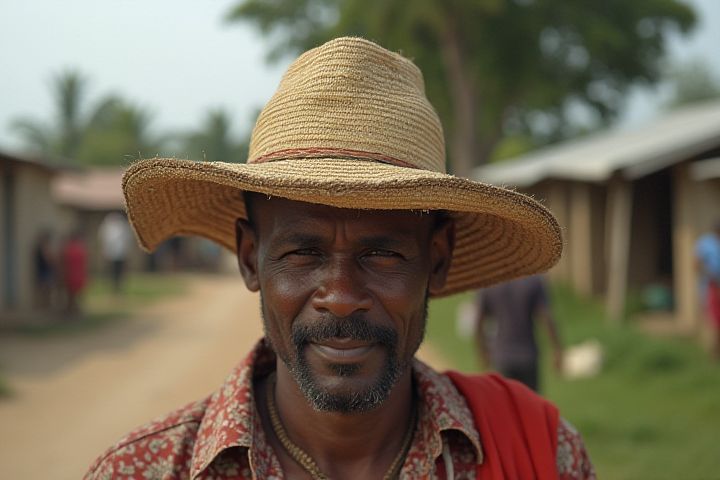
Nigeria offers a diverse range of travel experiences, from the bustling streets of Lagos to the serene landscapes of the Jos Plateau. Explore the rich cultural heritage in cities like Kano and Ibadan, where historical sites and traditional markets showcase the nation's vibrant history. The country's national parks, such as Yankari National Park, provide opportunities for wildlife enthusiasts to encounter elephants, baboons, and various bird species in their natural habitat. Coastal towns like Calabar and Lekki boast stunning beaches, while the unique rock formations in Aso Rock present perfect hiking trails for adventure seekers. Embrace the local cuisine with dishes such as jollof rice and suya, giving your taste buds a memorable experience of Nigeria's culinary landscape.
Visa requirements
Traveling to Nigeria requires careful consideration of visa requirements, as they vary depending on your nationality and purpose of visit. Most travelers will need to apply for an appropriate visa through the Nigerian embassy or consulate in their country, with the tourist visa being one of the most common options. Documentation such as a valid passport, recent passport-sized photographs, proof of accommodation, and travel itinerary is generally required for the application process. It's essential to check the latest guidelines prior to your trip, as regulations may change and additional requirements may apply.
Currency exchange
When traveling in Nigeria, it's essential to be informed about currency exchange options to maximize your budget. The local currency is the Nigerian Naira (NGN), which can be easily exchanged at banks, authorized exchange bureaus, and major hotels. Avoid exchanging money on the street to prevent scams and ensure you receive a fair rate. You can also use credit or debit cards for transactions in urban areas, but be sure to notify your bank beforehand to avoid any service interruptions.
Safety precautions
Traveling in Nigeria necessitates prioritizing safety precautions to ensure a secure experience. It is essential to stay informed about regional security situations, particularly in areas with higher crime rates or civil unrest. Engage reputable transport services and avoid public transportation at night to minimize risks. Always keep emergency numbers handy, and consider registering with your embassy for additional support while navigating the diverse landscapes and vibrant cultures of Nigeria.
Local transportation
Local transportation in Nigeria encompasses a variety of options, ensuring accessibility and mobility across the diverse landscape. You can choose from the ubiquitous commercial motorcycles, known as "okadas," which offer quick and agile transport through congested urban areas. Buses, whether large state-run or smaller, privately-owned vehicles, provide budget-friendly travel between cities and within towns, making them a popular choice for commuters. For a more traditional experience, local taxis and shared vehicles such as "keke napep" also play a vital role in connecting communities, reflecting the vibrant culture of Nigerian daily life.
Cultural etiquette
Understanding cultural etiquette is vital when traveling in Nigeria, a country rich in diverse traditions and customs. Greetings are an essential aspect, with handshakes and warm smiles creating connections; it's customary to greet elders first. Dress modestly, especially when visiting religious sites or rural communities, as respect for local values is highly regarded. Observing local dining etiquette, such as using your right hand to eat and waiting for the host to start the meal, will enhance your experience and appreciation of Nigerian hospitality.
Language variations
Nigeria is a linguistically rich country, home to over 500 distinct languages, with three major ones being Hausa, Yoruba, and Igbo. Each language embodies unique cultural nuances and dialects, reflecting regional traditions and interactions. For travelers, understanding local languages can enhance connections with communities, offering deeper insights into traditions and social practices. Embracing these linguistic variations not only enriches your experience but also fosters respectful engagement with the diverse Nigerian populace.
Health recommendations
When traveling in Nigeria, it's crucial to prioritize your health by getting vaccinations for diseases such as Yellow Fever, Hepatitis A, and Typhoid Fever. Malaria prophylaxis is highly recommended, especially if you're visiting regions where the disease is prevalent. Stay hydrated with bottled water, as tap water may pose health risks, and practice safe food consumption by eating well-cooked meals from reputable sources. Lastly, ensure you have comprehensive travel health insurance that covers medical emergencies and treatment or evacuation, ensuring your travel experience remains safe and enjoyable.
Popular attractions
Nigeria boasts a wealth of popular attractions that highlight its rich cultural heritage and breathtaking landscapes. The ancient city of Kano features the famous Gidan Makama Museum, showcasing traditional Hausa architecture and artifacts. In contrast, the vibrant city of Lagos is home to the Nike Art Gallery, where you can admire and purchase stunning local artworks. The natural beauty of Nigeria is exemplified by the awe-inspiring Olumirin Waterfalls in Osun State, offering a perfect spot for nature enthusiasts to explore and unwind.
Local cuisine
Nigeria's local cuisine offers a vibrant tapestry of flavors and ingredients, reflecting the diverse cultures across its regions. Dishes like jollof rice, which blends rice, tomatoes, and spices, exemplify the nation's love for communal dining and celebration. From the spicy suya skewers of the North to the rich, peppery soups like egusi in the South, each meal tells a story of tradition and heritage. Exploring street food markets will immerse you in the authentic experience of Nigerian life, where food is not just nourishment but a pivotal part of social interaction.
Connectivity options
Traveling in Nigeria offers diverse connectivity options, ensuring seamless movement across its vast landscape. Major cities like Lagos, Abuja, and Port Harcourt are well-served by domestic flights, connecting travelers to regional hubs swiftly. The extensive network of roads, particularly the Lagos-Ibadan Expressway, allows for efficient bus and taxi services, while ridesharing apps like Uber and Bolt are increasingly popular in urban areas. For rail travel, the Nigerian Railway Corporation is modernizing its services, providing an alternative mode of transport that enhances accessibility across key routes.
